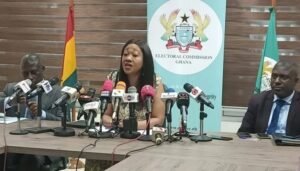
President Nana Akufo-Addo and former president John Mahama
London-based Economist Intelligence Unit is predicting an electoral victory for the governing New Patriotic Party (NPP) as Ghana goes to the polls in 2020.
According to the research and analysis arm of the Economist Group, the Akufo-Addo-led government is largely seen as a better custodian of the country’s economy than the opposition National Democratic Congress.
It is for this reason why the latest country report released on September 13 by the Economist expects the NPP to retain power with Nana Akufo-Addo as its presidential candidate.
It also believes strongly that the economic situation during the remainder of the term in office of the president will generally improve.
“In the presidential election, Mr Akufo-Addo will face a challenge from John Mahama — Ghana’s president from 2012 to early 2017 — who was elected leader of the opposition NDC in February 2019.”
The Economist Intelligence Unit is convinced how Mr. Mahama managed Ghana’s economy under his leadership would be an albatross on his neck going into the next major elections.
“The campaign for the 2016 election was dominated by the faltering economy, which many Ghanaians still associate with Mr Mahama. As a result, The Economist Intelligence Unit believes that it will be difficult for the NDC under Mr Mahama to portray itself as the better custodian of Ghana’s economy, especially as the country’s growth outlook is fairly strong,” it analysed.
“We therefore expect Mr Akufo-Addo and the NPP to secure re-election in 2020. However, if the NDC can present a coherent opposition and hold the NPP to account on unfulfilled campaign promises – particularly on job creation and industrialisation, where progress has been generally slow and success patchy — the election could be closely contested.”
Though corruption has recently been a topical issue with many, championed by the opposition, condemning how corruption is being managed by the Akufo-Addo government.
But the country report by the Economist Intelligence Unit did not see corruption as playing a role in government’s fortunes in next year’s elections.
It however acknowledged, “corruption in the public sector remains endemic, however, and a source of concern among the population”.
Political and economic outlook
The next national elections are due in 2020. The Economist Intelligence Unit expects the ruling New Patriotic Party (NPP) to retain power, as the party is seen as a better custodian of the economy than the opposition National Democratic Congress.
The NPP’s ambitious industrialisation programme will enjoy some success, with investment expected to continue, but overall progress will be hampered by structural weaknesses and regional imbalances.
Rising oil and gas production will continue to support real GDP growth during the forecast period, with growth averaging 5.9% a year in 2019-23.
The government’s industrialisation push and moves to strengthen the banking sector will benefit non-oil economic growth, although the cost of capital will be prohibitive for some businesses, particularly small and medium-sized enterprises.
Inflation will remain high in 2019, at an average of 9.5%, given a weakening currency and strong growth in private consumption. The rate will remain close to the ceiling of the official 6-10% target range in 2020-23 for similar reasons.
The cedi will remain prone to periods of volatility, given the country’s exposure to movements in commodity prices. From an average of GH¢4.58:US$1 in 2018, the currency will weaken to GH¢6.47: US$1 in 2023.
We forecast that the current account will shift from an estimated deficit of 1.8% of GDP in 2018 to a surplus of 0.5% of GDP in 2023, owing to rising oil exports over the forecast period.
Source: 3news.com








